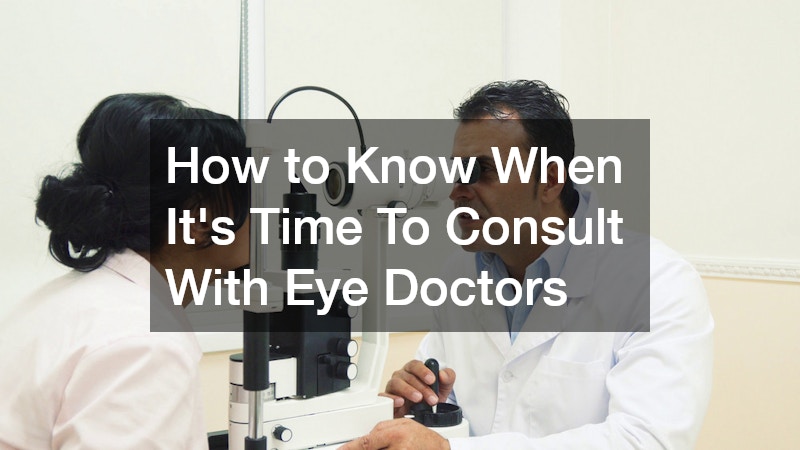
Your eyes are one of the most vital organs in your body, and maintaining their health is crucial for quality living. However, we often overlook them until we experience discomfort or vision problems. Knowing when to consult with eye doctors can save you from serious health concerns and enhance your overall quality of life.
Regular eye check-ups are essential for everyone, regardless of age. They recommend that individuals have their first eye exam by the age of one, and then every one to two years thereafter, depending on age and risk factors.
Video Source
These exams can help detect early signs of conditions like glaucoma, macular degeneration, and diabetic retinopathy.
During an eye exam, an eye doctor will not only test your vision but also check the overall health of your eyes. They can identify underlying health issues such as high blood pressure and diabetes, which can manifest through sight problems. Therefore, even if you feel your vision is normal, regular visits can proactively address potential issues before they escalate.
Certain life stages or conditions may necessitate more frequent visits. For example, children, seniors, and pregnant women often require specialized care and attention when it comes to their eye health. It's vital to consult with eye doctors who can provide tailored recommendations based on your specific circumstances.
Becoming aware of the symptoms that indicate it's time to consult with eye doctors is crucial for maintaining your eye health. Common indicators include persistent headaches, blurred vision, and difficulty seeing at night. Ignoring these warning signs can lead to increased complications or even irreversible damage.
If you experience sudden flashes of light, floaters, or a curtain-like shadow over your vision, you should seek immediate medical advice. These symptoms could indicate serious conditions such as retinal detachment, which require prompt attention from eye doctors. Early detection is key to mitigating long-term consequences.
It’s also important to pay attention to your eye discomfort. If your eyes frequently feel dry, irritated, or you experience excessive tearing, it can be a sign that something is wrong. Consulting eye doctors can help in diagnosing the root cause—be it environmental factors, allergies, or a more serious underlying condition.
Your lifestyle can significantly impact your eye health, and it’s essential to evaluate it regularly. Factors such as screen time, UV exposure, and smoking can contribute to deterioration over time. If your daily routine includes prolonged computer use or you work in a digital environment, you may want to consult for specialized advice on protecting your eyesight.
Diet and exercise play crucial roles in how well your eyes function. A balanced diet rich in vitamins A, C, and E, as well as Omega-3 fatty acids, supports eye health. If you're unsure whether your diet is sufficient for your eyes, reaching out to a vision care professional can provide the guidance you need.
Additionally, if you have a family history of eye diseases, it’s critical to consult with professionals even if you currently experience no symptoms. Genetics can play a significant role in your eye health, and proactive measures can make all the difference. Regular assessments by eye specialists can help implement preventive strategies tailored to your genetic risks.
There’s a strong connection between overall health and eye care, and many systemic health conditions can affect your vision. Conditions such as diabetes, high blood pressure, and autoimmune disorders often show symptoms in the eyes. This makes it even more critical to work with eye doctors who are in tune with the interplay between your systemic well-being and ocular health.
Like, diabetic patients must have regular eye exams to detect any diabetic retinopathy early on. The ramifications of ignoring eye care in such circumstances can significantly compromise one's quality of life. Partnering with those who understand these interconnections can lead to more comprehensive care.
Taking a holistic approach to health can enhance your entire well-being, including your eyesight. Medications and lifestyle choices affect your vision; thus, ongoing discussions with healthcare providers about your total health should include eye health considerations. Your eye doctors can be a pivotal part of this team, ensuring you don’t overlook vital signs and symptoms of deteriorating vision.
Knowing when to consult with eye doctors is an essential skill for maintaining your eye health and overall well-being. Regular check-ups, being mindful of symptoms, examining lifestyle habits, and understanding the connection between your overall health and vision are critical steps. By staying proactive about your eye health, you can prevent potential issues and enhance your quality of life.
.